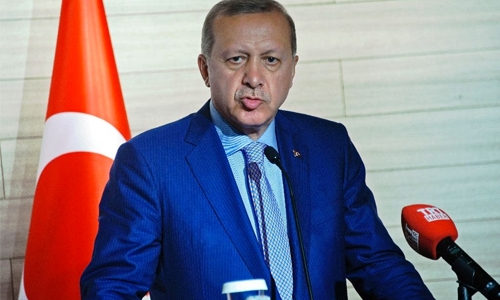EU, Germany hit back at Erdogan in genocide row
Berlin: German politicians hit back Thursday at Turkey's president for accusing lawmakers of Turkish origin of having "tainted blood" in a row over whether the Ottoman Empire committed genocide in World War I.
President Recep Tayyip Erdogan reacted furiously after the 11 German MPs with Turkish roots last week backed a parliamentary resolution that recognised the mass killings of Armenians as a genocide.
The sensitive issue has infuriated Erdogan at a time when relations are already strained by disputes about media freedom, while the EU is banking on Turkey to stop the cross-border flow of migrants.
A group of Turkish lawyers has also filed a complaint with prosectors asking for the 11 German lawmakers to be charged with "insulting Turkishness and the Turkish state," the Hurriyet daily reported.
European Parliament President Martin Schulz wrote to Erdogan to voice his "great concern" about his "verbal attacks and allegations concerning freely elected members of the German Bundestag".
Schulz, a German national, also condemned "in the strongest terms" Erdogan's comments linking the lawmakers to "terrorists", in reference to the outlawed Kurdistan Workers Party (PKK).
Lawmakers and journalists' ability to work "without having to fear repression is part of the non-negotiable foundation of every democracy," he wrote.
Schulz warned that if national leaders challenge these rights, this "can be damaging to international relations in the long run".
- 'Hateful threats' -
The German parliament's president, Norbert Lammert, said that statements by Turkish leaders had prepared the ground for a torrent of "hateful threats and insults" that were mailed to the MPs.
"I would not have thought it possible that a democratically elected president in the 21st century mixes his criticism of democratically elected representatives of the German Bundestag with doubts about their Turkish origin, that he refers to their 'tainted blood'," Lammert said in an address to the chamber.
He added that "anyone who tries to pressure individual MPs with threats must know that he is attacking the whole parliament".
Lammert also warned that "we will respond accordingly with all options available to us under the law".
Erdogan late Wednesday spoke of people with "tainted blood" -- explaining he meant those "who wrong their own people" -- and pointed at the "members of parliament in Germany that accuse their own country of genocide".
His comments went a step further than remarks at the weekend in which he suggested the MPs should undergo blood tests to see "what kind of Turks they are".
Germany's foreign ministry on Tuesday asked in the Turkish charge d'affaires to say that recent statements about German MPs were met with "incomprehension" in Berlin.
- Mass killings -
One of the German lawmakers, the Green party's Cem Ozdemir, told Turkey's Armenian weekly Agos that while he and other parliamentarians were the targets of "death threats and insults", at least they were "not incarcerated" and not had their "immunity lifted for having simply expressed what we thought, unlike our colleagues in Turkey".
The Armenian issue has thrown Turkey into conflict with a number of countries that have labelled the mass killings a genocide.
Armenians say some 1.5 million of their people were killed in a genocidal campaign by Ottoman forces -- ordered by the minister of war, Enver Pasha, and other top officials -- to wipe them from Anatolia.
But Turkey insists similar numbers of Muslims and Armenians were killed during wartime conflict and has always fiercely resisted pressure to recognise that any genocide took place.
The dispute comes while the EU and Turkey are locked into a deal to contain the migrant crisis, which last year sent record numbers of people fleeing Syria and other war zones and trouble-spots into Europe.
Turkey has pledged to stop migrants from travelling to EU member Greece, and to take back illegal migrants from there, in return for financial aid and benefits including visa free travel for Turks to most of the EU.
Related Posts

